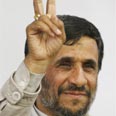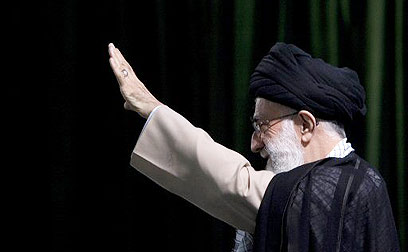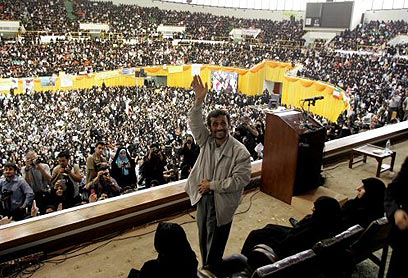
The Ynet guide to the presidential elections in Iran
Has the Tehran vote been decided? What is the nature of the Islamic Republic's regime? Who are the candidates? We answer some of the more burning questions about June 12's elections
Electorally perplexed about Iran's presidential race?
Millions of voters, televised debates, Facebook support groups and Twitter updates – welcome to the Islamic Republic's presidential campaign.One mustn’t be fooled by the open demeanor and electronic façade: Iran is far from being a Western democracy – but just how different is it? Are the Iranians really free to choose their president? And how creditable are the poles? Ynet presents the essential facts.
The basics
What it the nature of the Iranian regime?Iran is a theocracy and as such it is ruled by Supreme Spiritual Leader the Ayatollah Ali Khamenei and his clerics. While the regime grants the citizens some personal freedoms in order to maintain its stability, political dissidents are jailed without trial, ethnic minorities are persecuted and homosexuals are executed.
Nevertheless, the regime does allow for some freedom of speech and press, and the public debate in Iran flourishes, both in printed media and online.
- For more on Iran, click here
Is the election process in Iran democratic?
The only absolute democratic element to the Iranian elections is Election Day, which allows millions of voters to decide who will govern the Republic, affect the economy, decide how far the Muslim dress code – i.e. the rules of Hijab – are enforced and what Iran's international image would be.

Pulling the strings. Ayatollah Ali Khamenei (Photo: Reuters)
The political process leading up to Election Day, however, is very rigid: A State Election Committee pre-approves the candidates and this year, despite having 450 people – including 42 women – apply to the committee, only four were approved. The lucky foursome are reigning President Mahmoud Ahmadinejad, former Prime Minister Mir-Hossein Mousavi, Former Speaker of the Majlis (Consultative Assembly) Mehdi Karroubi and former Commander of Iranian Revolutionary Guard, Mohsen Rezaei – all Khamenei loyalists.
Free to choose?
Can the results be fixed?
Not necessarily. Ahmadinejad's victory in 2005 was a surprise and so was that of his predecessor Mohammad Khatami in 1997. Much depends on the Iranian people's desire for a change.
Are the Iranians really free to vote as they see fit?
To a great extent – yes. The voting process itself is meant to be free and fair. No monitors will be stationed in the ballots, and some voting stations are bound to be compromised, but the Iranians are free to vote according to their conscious.
The results will be published on June 13 and if none of the candidates marks a clear victory of over 50% - a likely scenario in the current campaign – the two candidates who were given the most votes will face off again within one week.
How many Iranians are eligible to vote? What it the country's voting rate?
According to the Iranian Ministry of Interior 46 million Iranians are eligible to vote in the 2009 elections, but many are expected to boycott them in protest of the oppressive regime and rising concerns of election tampering.
Voting rates are usually noted around 50%, but analysts believe that June 12 will see voting rates of 60% and higher, as the reformists will try to do everything they can to topple Ahmadinejad – who stands to gain from a low voting rate.

Mass appeal. Mahmoud Ahmadinejad (Photo: AFP)
Who are the reformists?
The Iranian reformists, or "moderates" as they have been dubbed by local media, subscribe to the principles of the 1979 Islamic Revolution, but wish to instate civil reformation, introduce progressive legislation, boost women's rights and push for greater personal freedoms, especially freedom of speech.
Nevertheless, internal openness does not necessarily spell one as far as foreign policies are concerned. The reformists may be inclined to hold a dialogue with the West, but their positions on Israel and Tehran's nuclear activity are identical to that of the conservatives, mainly because the ayatollah is the one pulling the strategic strings.
Presidential prospect
Is Ahmadinejad favorite to win?Not necessarily. Many are disappointed with the economic hardship and soaring unemployment, and believe that the current president is spending too much time on supporting Hamas, Hizbullah and the Palestinians, and not enough time on Iranian affairs. Ahmadinejad's foreign policies have also been harshly criticized, as his aggression towards the West has left Iran isolated in the international arena.
What plays in favor of Ahmadinejad?
The reigning president has an organized government system to his advantage, as well as the support of the lower socioeconomic echelons. Nevertheless, his opponents claim his "bought" that support by approving increased stipends.
Who does Mousavi appeal to?
The former prime minister has been endorsed by former President Khatami, leader of Iran's Reformist Movement, and he has the support of the younger voters. Mousavi has made the best use of the internet of all the candidates, and he appeals mostly to the educated, urban voters and students.
Are there election poles? Would ballot sampling be held once the vote in over?
The Tehran media featured many election poles in the weeks leading up to the elections, but since Iran does not have an independent poling firm and since the poles were ordered by the candidates themselves, their credibility is somewhat questionable.
Ballot sampling is highly unlikely, as only the final result is published once all the votes have been tallied.










